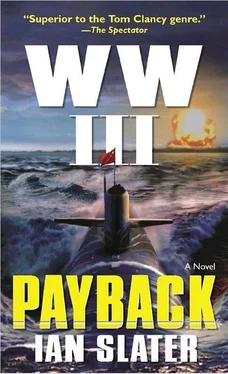“Where do you think the product is coming from, General?”
“Don’t know. If we catch any of those bastards maybe we can have a little talk with them.”
“Roger that,” said Aussie with feeling. “I’d like to have five minutes with one of the bastards. I’ll keep in touch. By the way, General, no need to be hesitant about what we’re saying on the blower anymore. The networks are all yakking about MANPADs.”
Freeman had no sooner put the phone, or “blower,” as Aussie called it, down than he was thinking again about the MANPADs’ backblast. He immediately called Eleanor Prenty, explaining to the National Security Advisor something that the mujahideen and later the anti-U.S. Taliban had never had to do in Afghanistan: change clothes after firing their MANPADs. The terrorists’ drill, having fired their weapons in such a high-density area, would be first to dump their launchers and disappear into the airport crowds, as he’d already told her; then they’d probably try to shower down before they donned their replacement clothing, in order to get rid of any scent of cordite, sulfur, et cetera, lest a K-9 dog squad sniff them out at the airport.
The general advised her to order NYPD and their counterparts in LAX and Dallas/Fort Worth to immediately shut off all water flow to airport shower stalls, detain anyone who was found using one, and go over them and the washbasins with the police’s handheld NBC sensor. Even if the terrorists had dumped the clothes they’d used while firing the MANPADs, the backblast was so pervasive it was like passing another vehicle on a dusty road with your windows open; particles wedged themselves into ears, nostrils, and especially in your hair. Even if their hair was shampooed, the particles could still be detected in trace amounts by the handheld sensors and, if necessary, analyzed by spectrometers either in the FBI’s portable field labs or in Homeland Security’s downtown forensic labs.
The order from Eleanor Prenty was out to all three airports within two minutes, and within another seven to ten minutes — it taking longer because of the endless corridors at Dallas/Fort Worth and an argument over who had first call on the electric carts, federal or local police — dozens of astonished, irritated, and some downright outraged citizens, most already fatigued by long flights from Alaska and South America, found themselves being ordered out of executive club and public coin-operated shower stalls into Immigration holding rooms, where they were being “swept” by NBC sensors and searched — some would complain violated — by no-nonsense AO, all-orifice, examinations.
Meanwhile, all waiting passengers, air crew, and airport staff were being sniffed by K-9 squads. At Dallas/Fort Worth, two Guatemalans, seeing the dogs approaching, made a dash through a packed waiting lounge for the nearest exit, police running after them, converging on them. One of the pair, a dark, mustachioed man in his early twenties, stopped and threw up his hands. The other, an older man, held a tubular map case close to his body with his left hand, one end on the floor, his right hand grasping the tube’s other end, which seemed to be either a screw- or pull-up top. “I have bomb! Nobody move!”
Nobody did, except for a terrified elderly woman who made to get up from her waiting-lounge seat but couldn’t unaided. A cop eased her back into the seat. “Don’t worry, ma’am. Just stay still. It’ll be fine. Just stay still.”
“It’s a bluff!” an FBI agent on the periphery of the overcrowded waiting lounge whispered into his voice-activated shirt-button mike to the just-arrived SWAT team, which had been swiftly summoned from patrolling the airport perimeter. “Ten to one he’s carrying dope.”
“You certain?” came the SWAT team’s CO’s response.
“Not a hundred percent.”
“Then we do it by the book. Bomb squad and negotiator are en route. Tell this guy someone’s coming — we’ll work it out. How’s he look?”
“Like they all do, sweating like a pig.” The agent held up his hands and called out to the Guatemalan, “Just relax! We’re gonna work this out, okay? You understand? We’ll work it out.”
“Nobody moves,” shouted the Guatemalan.
“Nobody moves,” the agent assured him. “Absolutely.”
The other Guatemalan with his hands up wasn’t moving, but he was talking rapidly to his partner in Spanish. But one of the words he used was “SWAT,” so then the one with the map case told a half-dozen passengers to “come here.” Most of them were taller than he. He told them to stand face-out in a circle about him, and told his ring of hostages, “Anyone turns around, anyone touches me, the bomb goes. You understand?”
Everyone understood, and it meant that for the SWAT team moving quickly, quietly into the airport, it was going to be virtually impossible to get a head shot — or any other shot, for that matter. Now the other Guatemalan, seeing how his buddy had brought temporary immunity with the threat of a bomb, got cocky, put his hands down, and moved over to his map-case friend.
“Shit!” said the FBI agent into his wrist mike, a profanity that would never have been condoned in Hoover’s day. “His accomplice is getting a ring of more people around them. Now we’ve got double trouble. Who’s our negotiator?”
“Ralph Fiennes,” cut in the SWAT commander. His real name was Ralph Fine but they called him “Fiennes” because he had the same lean build and intense eyes as the movie actor.
“We don’t want him,” snapped the FBI agent. “We need casual cool with these two, not Sigmund Freud.”
“Here he is,” cut in the SWAT commander from behind a ticket counter. “He’s riding a cart. No necktie — looks like he’s gonna do his casual serious bit.”
Fine was undoing the top button of his shirt. “This place stinks like a locker room. Everybody’s sweating. Where’s the bomb squad?”
“En route,” the SWAT commander told him. “What’s the matter? You sweating, Mr. Fine?”
“Just a little,” Fine said. “It’s hot. You think you might get a shot at him?”
“Dunno, there’s a lot of people around him.”
“Around them, ” cut in the FBI agent. “Don’t forget the second guy.”
“I won’t,” said Fine. “We’ll know more when—”
“Hey!” shouted the second Guatemalan. “Those cameras. Turn those stinking cameras off.”
“They are off,” said the FBI agent.
“No, they’re not,” said Fine, alighting the cart about thirty feet from the ring of terrified hostages, his body language that of a golfer approaching the nineteenth hole, his eyes, however, never moving from the Guatemalan with the map case. “We’ll duct-tape ’em — the cameras. How’s that?”
“Yeah,” said the one with the map case. “You do that. Duct-tape ’em right now.”
“That wasn’t any help,” said Fine, talking to the FBI agent who was standing off to his right. “You lying about the cameras. Makes them nervous. Let me handle this. You go over to that newsstand and get some tape, plastic carrying bags, anything, to stick over those security cameras. Stand on someone’s shoulders if you have to!”
“It isn’t a bomb,” said the FBI agent. “He’s a druggie. Saw the sniffer dogs and panicked. Nowhere to run.”
“You might be right,” said Fine. He looked over at the one holding the map case. “I’m Agent Fine. Mr. — ?”
The Guatemalan hesitated. “Gonzales.”
“What do you want, Mr. Gonzales?”
“I want you should get a plane for me an’ my frien’. Right now. These people come with me — us — to Cuba.”
Ralph Fine scratched his head. “That’s going to take a little while to organize, Mr.—”
Читать дальше












